2020 CMP Competition Rulebooks Are Now Official
Posted by Junior Shooters
By Gary Anderson, DCM Emeritus

Covers of the four new CMP Competition Rulebooks that will govern CMP sponsored and sanctioned competitions in 2020.
The CMP Competition Rulebooks that will govern CMP sponsored and sanctioned Highpower Rifle, Pistol, CMP Games and Smallbore Rifle competitions in 2020 have been approved by the CMP Board’s Rules Committee and are now posted on the CMP website. The 2020 rulebooks went into effect on the 1st of January. All four rulebooks can be downloaded from the CMP Competition Rulebooks webpage at: http://thecmp.org/competitions/cmp-competitions-rulebooks/.
The most important changes in the 2020 Rules include a major expansion of CMP Pistol Program rules that now provide for 3-Gun Match Pistol events, the establishment of Smallbore Rifle Distinguished Badges, a change in eye and hearing protection use in Highpower Rifle and Pistol Matches from “strongly urged” to “required,” a substantial reworking of rules for electronic scoring targets and several rule clarifications in each of the four disciplines. All changes from the 2019 Rules can easily be identified in the new rulebooks because they are shown in underlined, red text (printed Rulebooks will have underlined text). A detailed summary of 2020 Rule Changes is presented at the end of this article.
The CMP rule-making process is designed to be transparent and open to inputs from competitors and match sponsors. Major changes like the expansion of the CMP Pistol program and adding Smallbore Rifle Distinguished Badges were designed to expand and enhance the CMP Competition Program. Most rule changes resulted from issues that came up during 2019 competitions or from recommendations submitted by competitors and match sponsors. Drafts of the new rulebooks were posted on the CMP website in November and comments were invited. Comments received, especially from pistol competitors and match sponsors, were very helpful in finalizing the 2020 Rulebooks.
Here are some 2020 CMP Rulebook changes that merit further explanation:
New Match Pistol Events. The CMP has already announced that it will expand its 2020 National Matches pistol program by offering a full week of pistol events. In addition to traditional CMP National Trophy Pistol Matches, the CMP National Matches will now include a three-day bulls-eye pistol 2700 aggregate for 22 Rimfire, Centerfire and 45 Caliber Pistols. The 2020 CMP Pistol Rules were expanded to provide specific rules to govern these events that are categorized as “Match Pistol Events.” The new rules establish a distinction between “National Trophy/EIC Pistol Events” for Service Pistols and 22 Rimfire Pistols with metallic sights and “CMP Match Pistol Events” for 22 Rimfire, Centerfire and 45 Caliber Pistols with any or metallic sights. The rules also expand the CMP Classification System to provide separate classifications for competitors’ National Trophy/EIC and Match Pistol scores. Match sponsors may now sanction competitions with CMP using the rules for either pistol discipline.
Smallbore Rifle Distinguished Badges. The Distinguished Badge Program, which dates back to the first Distinguished Marksman Badges awarded by the Army in 1884, is being further expanded in 2020 to award two new badges for excellence in Smallbore Rifle competitions. Gold Distinguished Badges are the highest individual awards authorized by the U. S. Government for excellence in marksmanship competitions. The CMP administers this program under authority granted to it by federal law (36 USC §40722). The new Distinguished Smallbore Rifle Three-Position Badge can be earned with top ten percent place finishes in 120-shot three-position EIC Matches shot with metallic sights on ISSF targets. The new Distinguished Smallbore Rifle Prone Badge can be earned with top ten percent place finishes in 160-shot prone EIC Matches shot with metallic or any sights on 50-yard, 50m and 100-yard national targets. To be awarded a badge, competitors must earn the traditional 30 EIC points by winning 10, 8 or 6 point “legs” in CMP sanctioned EIC matches. The CMP National Smallbore Rifle Championship that will take place at Camp Perry in July will include Smallbore Rifle EIC Matches. Match sponsors that would like to conduct CMP-sanctioned Smallbore Rifle EIC Matches should contact: bdonoho@thecmp.org.
Mandatory Eye and Hearing Protection for Highpower Rifle and Pistol. The overwhelming majority of highpower rifle and pistol competitors already wear eye and hearing protection while shooting. Earlier in 2019, a competitor at the CMP Marksmanship Park near Talladega had a catastrophic rifle failure that likely would have resulted in severe eye injury had they not been wearing shooting glasses. There are also many shooting clubs that now require eye and hearing protection on their ranges, plus virtually all military ranges, including some where the CMP conducts its matches, require eye and hearing protection. The CMP conducted an extensive legal and operational evaluation of this situation and concluded that in highpower rifle and pistol shooting the possibility of serious eye injury, while very rare, warrants the CMP taking the additional precautionary step of requiring all competitors in these events to wear eye and hearing protection. The 2020 CMP Highpower Rifle, Pistol and CMP Games Rulebooks all contain this new rule:
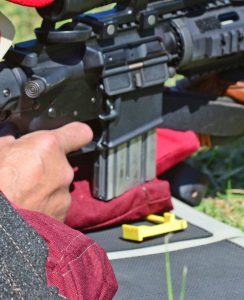
Resting the entire bottom of an M16/AR magazine on the jacket elbow pad or sleeve as shown in this photo is an illegal prone position under the 2020 rules.
All competitors and competition officials are required to wear appropriate eye and hearing protection when on shooting range firing lines during highpower rifle or pistol firing. All competitors must comply with this requirement before they can participate in a CMP sponsored or sanctioned competition. Competitors are responsible for selecting their eyewear and hearing protection.
The CMP is establishing a minimum standard that all highpower rifle and pistol competitors must wear some type of eye protection, but it is not mandating that competitors must wear any particular type of shooting glasses. The new rule states, “competitors are responsible for selecting their eyewear and hearing protection.” This means that while all competitors must wear some form of eyewear and hearing protections when on the firing line, it is up to them to decide what type of eyewear will provide adequate protection for them. Most competitors already use shooting glasses with hardened lenses, but others may decide that their prescription eyeglasses or special shooting glasses are most appropriate for them.
The CMP and its sanctioned match sponsors will actively enforce this rule in 2020. The CMP respectfully asks any highpower rifle or pistol competitors who are not already wearing eye protection while shooting to acquire a good pair of shooting glasses and to wear them at all times while they are shooting.
Approved Service Pistols. When the CMP opened its Service Pistol events to more than M1911 or M9 type pistols in 2015, it provided a list of “Approved Service Pistols” that could be fired in these events. This list identified specific pistol models and model variations that could be used in Service Pistol Matches, if those pistols complied with the Service Pistol requirements in Rules 4.1.1 and 4.1.2. Those requirements include having a 4.0 lb. trigger pull, a barrel length of 5.4” or less, standard symmetrical grips and several other less common restrictions. Unfortunately, keeping this list current with all of the variations of basic models that manufacturers were introducing proved to be nearly impossible. Starting in 2020, the list of model variations is being pared down so that in most cases only basic, generic models will be listed, with the intent that all pistol variations of a basic model that fulfill Rule 4.1.1 and 4.1.2 requirements will be approved.
Prone Position, Highpower Rifle. Concerns came up during the past year because a few competitors were resting M14 or M16/AR magazines on their left arms or shooting jacket sleeves. The prone position rule has been strengthened to state that while “a magazine may touch the shooting jacket sleeve,..it may not rest on the jacket sleeve, jacket elbow pad, arm or ground.” There is a pretty clear difference between touching and resting. Competitors must control their prone positions to make sure the bottom of the magazine does not rest on their jacket sleeve, elbow pad, arm or ground. Competitors can make sure their prone positions are not questioned by keeping the bottoms of rifle magazines visibly clear of their sleeves or arms.
Electronic Scoring Target (EST) Rules. With the development of new types of electronic scoring targets that use technology other than traditional acoustical sensing systems, CMP EST Rules needed to be more inclusive. Electronic target rules in the 2020 CMP Rulebooks were amended to authorize a wider variety of electronic targets. The rules for resolving E-target scoring issues like excessive shots (usually crossfires), missing shots (usually crossfires) and score protests (occasional target malfunctions, but usually shooter error) were clarified but remain essentially unchanged. A key to satisfactorily resolving missing shot complaints and score protests is to use backer targets or a secondary verification system.
The CMP also uses scoring ring overlays with its highpower electronic targets so competitors who use optical sights can use them as aiming reference points. A new rule makes it clear that when scoring ring overlays are provided, they are there as reference points only and that scoring ring overlays cannot be used to rescore shots scored by electronic targets.
Recent complaints reaching the CMP questioned whether the rule that prohibits protesting 9s, 10s and Xs is fair. The reason that rule is there is because there is no fair, practical or accurate way to rescore a shot indicated as a close 9 (9.9) to determine if it might be a 10. Even a clean backing target cannot be used to make a determination that precise. To reverse plot three or four other shots in a series so the radius of a protested shot could be measured would take 15 or 20 minutes per protested shot to recover a backer and make these calculations. Moreover, even this plotting and measuring technique has its own inaccuracies and is not an acceptable way to rescore close shots. The scoring ring overlays now used on CMP E-target aiming bulls cannot be used to rescore selected shots because to be fair all competitors’ shots must be scored using the same scoring system. “All shots fired in one competition must be scored with only one method of scoring” Rules H3.10.1, G3.8.1, P3.10.1, S8.1.2).
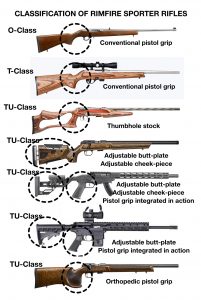
Resting the entire bottom of an M16/AR magazine on the jacket elbow pad or sleeve as shown in this photo is an illegal prone position under the 2020 rules.
The motivation for competitors wanting to rescore, challenge or protest selected close shots is debatable anyway. When challenges of close shots are permitted on paper targets, the only shots that are ever challenged are the shots that are just out. Shots that are just in are never challenged. Unless all close shots of all competitors are rescored in the same way, whether just out or just in, allowing selective challenges is fundamentally unfair. Shots that are obvious errors are another matter; competitors have a right to ask match officials to remark an obvious error on paper targets or to examine a questioned E-target under Rule 6.6.6 a).
When E-targets are used, the answer to these concerns is to make sure all targets on a range are scoring accurately and that any claims of inaccurate scoring are promptly checked out and, when necessary, corrected. The CMP goes to great lengths to make sure its E-targets are in good condition and are scoring accurately and it hopes all shooting clubs that use E-targets are doing the same thing.
Rimfire Sporter Rifle Classification. The use of rifles with special features not authorized on T and O-Class Rifles (i.e. thumbhole stocks, adjustable butt-plates and cheekpieces, orthopedic pistol grips, etc.) was addressed in the 2019 Rules with a rule change that placed rifles having those special features into an expanded “Tactical or Unlimited Class.” The problem encountered in enforcing this rule was how to properly distinguish those TU-Class Rifles from T and O-Class Rifles that must be “standard sporter-type rifles of conventional appearance.” The 2020 CMP Games Rimfire Sporter Rules include additional guidelines for doing this. The new Rulebook also includes a chart designed to assist match officials in making decisions regarding Rimfire Sporter Rifle classification decisions.
Summary of 2020 Changes in CMP Competition Rules
HIGHPOWER RIFLE RULES:
- Rule H2.11. Open Category Teams. Events for open teams where there are no specific eligibility requirements may be included in competitions that use CMP Cup Match Rules.
- Rule H3.2.6. Scorers Duties. An expanded list of Scorer responsibilities is provided.
- Rule H3.2.7. Verifiers Duties. Responsibilities for verifying rifle checks and standing rapid-fire starts (when required) were added.
- Rule H3.6.2. Eye and Hearing Protection. The CMP now requires the wearing of eye and hearing protection during highpower rifle and pistol firing.
- Rule H3.10.12. Tie-Breaking. Added a shot-by-shot count-back rule for breaking ties in slow-fire events that cannot be broken by using Xs or stage scores.
- Rule H4.1.1 b). Ambidextrous Features. Ambidextrous safeties, magazine releases and charging handles are now permitted; the Armed Services are now using them.
- Rule H4.1.1 e). Rifle Handguard. The requirement that handguards must have Picatinny rail sections was deleted.
- Rule H4.1.3 l). Optical Sights on M14/M1A Rifles. Optical sights will now be permitted on these rifles. Note: M14/M1A rifles fired as Standard Modern Military Rifles must have “standard issue-type metallic front and rear sights” (Rule G5.2.4 b).
- Rule H5.1.3. Prone Position. Added language that explicitly prohibits resting the magazine on the arm or on the jacket elbow pad.
- Rule H5.2.2. Sighting Shots. Clarified that when sighting shots are authorized by the Match Program, the competitor can elect not to fire them.
- Rule H5.2.7. Refires. Refires authorized for a range alibi or an excessive hit target must be conducted before the concerned competitor leaves the firing line and immediately after the scoring period for other targets on that relay.
CMP GAMES RULES:
- Rule G1.7.6. Scorer. Same as H3.2.6.
- Rule G1.7.7. Verifier. Same as H3.2.7.
- Rule G3.1.2. Eye and Hearing Protection. The CMP now requires the wearing of eye and hearing protection during highpower rifle and pistol firing.
- Rule G3.3.3. Prone Position. See H5.1.3.
- Rule G5.2.1 h). Carbine Rear Apertures. Authorized alterations of internal diameters of rear sight apertures if the alterations do not change the external profile of the disc.
- Rule G5.2.4 d). Standard M1A Rifles. The weight limit was increased from 9.0 to 9.4 lbs. The FN SCAR 17S was added to the list of Class B Modern Military Rifles.
- Rule G8.2.2. Rimfire Sporter Rifle Classification. Criteria for classifying a Rimfire Sporter Rifle as either a “Standard Rimfire Sporter Rifle” or as a Tactical or Unlimited Rimfire Sporter Rifle were strengthened. A chart showing rifle classification guidelines was added.
- Annex G. Achievement Award scores were updated. Most changes increased or decreased cut scores by only one or two points, except for significant increases in Vintage Sniper and Unlimited Garand cut scores.
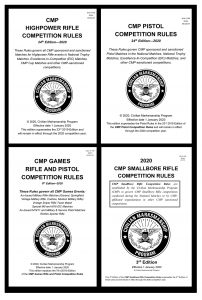
Covers of the four new CMP Competition Rulebooks that will govern CMP sponsored and sanctioned competitions in 2020.
PISTOL RULES:
- Rule P1.4, Table 1. CMP Recognized Pistol Events. A distinction is made between “National Trophy/EIC Pistol Events” and new “Match Pistol Events.” 900 aggregates for 22 Rimfire, Centerfire and 45 Caliber Pistol are added. There is also a new 2700 aggregate for all three events combined.
- Rule P2.6.3. Grand Senior. A Grand Senior category for competitors 70 years of age or older was added as an option for match sponsors to use.
- Rule P2.11. Open Teams. An Open Team category can be used in competitions that use Match Pistol Rules. Open Teams are not permitted in competitions that use National Trophy/EIC Rules.
- Rule P3.2.6. Verifier. Responsibility for verifying pistol checks was added.
- Rule P3.6.2. Eye and Hearing Protection. The CMP will now require the wearing of eye and hearing protection during highpower rifle and pistol firing.
- Rule P3.7.5. Firing Times. A firing time definition is provided that allows for conducting many pistol events on turning or fixed targets. EIC Matches must be fired on turning targets.
- Rule P3.11.4. Classification System. The system is expanded to provide classifications for the new 2700 Match Pistol events.
- Rule P4.1.3 a). M1911 Service Pistols. Clarified that M1911 Service Pistols must have single-stack magazines.
- Rule P4.1.3 c). Approved Service Pistols. Confirmed that new Armed Services M17 and M18 pistols are approved for use in CMP Service Pistol Matches and that they can be accurized in conformance with Rule P4.1.2.
- Rule P4.1.4. Other Approved Service Pistols. The list is being modified to identify basic models, with the intent that all pistol variations of a particular model that comply with Rules P4.1.1 and P4.1.2 (4.0 trigger pull, 5.4” maximum barrel length, metallic sights only, no weighted grips, etc.) will be accepted. Smith & Wesson M10 and M15 revolvers were added to the list (Revolvers must have a 2.5 lb. minimum trigger pull).
- Rule P4.2. General Rules for Match Pistols. This new rule provides basic standards for pistols that are fired in 2700 aggregate matches and specific rules for 22 Rimfire, Centerfire and 45 Caliber Pistols that are used in these matches.
- Rule P4.7.2. Pistol Targets. A 25-yard slow-fire target was added.
- Rule P5.1.1 b). 22 Rimfire Pistol Ready Position. An illustration of the 45-degree arm angle ready position was added. The rules clarify that this position must be used when 22 Rimfire EIC Matches are fired. The pistol and arm must be down at a 45-degree angle when the RO commands READY ON THE FIRING LINE and cannot start up until targets start to turn. Arms lowered to 20 or 30 degrees are not legal.
- Rules P5.2.3-5.2.5. Pistol Event Courses of Fire. These rules provide new 900 aggregates for 22 Rimfire, Centerfire and 45 Caliber pistols.
- Rule P5.2.6. Service Pistol Match. This rule creates a 900 aggregate for Service Pistols.
- Rule P5.3.3. Match Pistol Three-Gun Aggregate. This rule creates a new 2700 Three-Gun Pistol Aggregate.
- Rule P7.4.2. National Trophy Individual Pistol Match. Provides that juniors who fire this match with 22 Rimfire Pistols may now earn 22 Rimfire Pistol EIC credit points.
- Rule P7.5. CMP National Championship Pistol Events. This rule lists new CMP National Championship Pistol events as follows (the final list depends upon the actual NM program):
- 22 Rimfire Pistol 900
- Center-Fire Pistol 900
- 45 Caliber Pistol 900
- 2700 Any Sight Aggregate Championship
- 2700 Metallic Sight Aggregate Championship
- Rule P10.3. National Records. This provides for the expansion of the record list to include the new Match Pistol events.
SMALLBORE RIFLE RULES
- S3.5.4. Club Teams. A requirement to have been a member for “at least 30 days” was added to prevent pick-up teams.
- S3.7.3 Distinguished Marksman Authorization. This allows competitors with disabilities to earn the Distinguished Marksman Badge by competing in smallbore rifle EIC Matches.
- S5.5.10. Bipods. Allows bipods to remain on rifles in prone events only.
- S11.1. CMP Achievement Pins. Added Achievement Pin cut scores for position and prone events.
- S11.3. Smallbore Rifle Distinguished Badges. Provides rules for the awarding of Distinguished Badges for Smallbore Rifle Three-Position and Smallbore Rifle Prone. EIC Matches must be 3×40 3-position or 4×40 prone (1600) events.
The Civilian Marksmanship Program is a federally chartered 501 (c) (3) non-profit corporation. It is dedicated to firearm safety and marksmanship training and to the promotion of marksmanship competition for citizens of the United States. For more information about the CMP and its programs, log onto www.TheCMP.org.

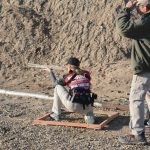
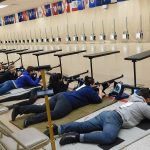
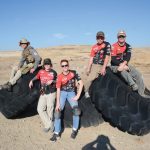
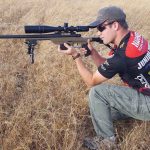
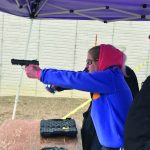
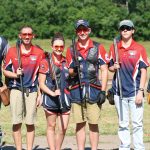
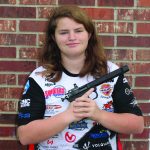
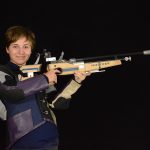
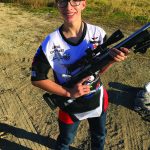

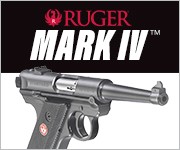



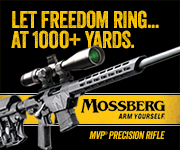
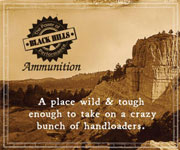
Comments
Leave a Reply
Please note: Comment moderation is currently enabled so there will be a delay between when you post your comment and when it shows up. Patience is a virtue; there is no need to re-submit your comment.
You must be logged in to post a comment.